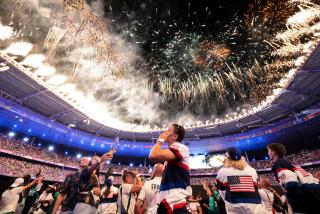USOC’s choice: Chicago or L.A.
Olympic tried and tested versus the rookie. West Coast versus the Midwest. A venerable Olympic stadium versus a field of dreams. The tag team of California Gov. Arnold Schwarzenegger and Los Angeles Mayor Antonio Villaraigosa versus Chicago Mayor Richard Daley.
OK, so the contest between Los Angeles and Chicago to become the U.S. bid city for the 2016 Summer Games probably won’t come down to sheer political star power. Then again, the magnetism of London bid leader Lord Sebastian Coe cannot be understated in helping his team prevail against Paris to win the right to stage the 2012 Games.
Now that the U.S. Olympic Committee officially decided to proceed with a bid for the 2016 Games, and will choose between Chicago and Los Angeles on April 14, one independent bid expert took note of recent history, looking at how the stadium issue played out in the London-Paris contest.
The Los Angeles Memorial Coliseum has been the Olympic Stadium both times the Games were here, most recently in 1984. Chicago, on the other hand, announced plans to build a 95,000-seat stadium in Washington Park on the South Side of the city.
Toronto-based Rob Livingstone has followed the Olympic bid process for more than 15 years, and is web producer of GamesBids.com, and noted the differences in what the IOC says and how it eventually votes. London offered to build an Olympic Stadium, while Paris planned to use an existing venue, the Stade de France, which played host to the 1998 World Cup final.
“On one hand, the IOC tends to say recently they don’t want a lot of construction, don’t want a lot of cost and risk,” Livingstone said, as what happened with the 2004 Games in Athens. “But when it comes to voting, they’re all excited about new things built for the Olympics.”
A rock-solid plan for an Olympic Stadium, or better yet, an existing one, has become paramount since New York’s bid for the 2012 Games imploded over exactly that issue. USOC Chairman Peter Ueberroth has said as much publicly and to the bid committees.
“There’s not a way Peter is going to take any chances this time,” said Tim Leiweke, president and chief executive of Anschutz Entertainment Group and a member of L.A.’s bid committee.
There has been tinkering with both bids since November, when stadium uncertainty forced San Francisco to withdraw its proposal and the race became a two-way contest. David Simon, the Los Angeles bid committee president, said in an interview Tuesday that there were “a handful of changes,” in the range of four to six, centralizing the venues.
Barry Sanders, L.A. bid chairman, said the group plans an announcement in about 10 days regarding enhancements to the Coliseum.
Officials from Chicago, meanwhile, held a news conference and spoke about alterations in their bid and that they now have raised $25 million. Beach volleyball, field hockey and the equestrian events have been moved.
Patrick G. Ryan, bid chairman and chief executive, said the equestrian facilities could be used by the public after the Olympics, in contrast to the first proposed location. One soccer venue for preliminary games will be out of state, at the University of Minnesota.
Chicago has never played host to an Olympics, and one point that officials attempted to drive home during the news conference and in a later interview was the issue of legacy. Legacy, of course, is not an issue for Los Angeles, considering its rich history of amateur athletics.
“You’re supposed to improve your community and that urban legacy for our Olympic Village is something we’re very proud of,” Ryan said in a telephone interview. “To do this right, we have to create sports legacy, that’s what the mission is all about. We chose athletics and aquatics and then had the good fortune to get this equestrian facility.
” ... Eight-five percent of the athletes will be within 15 minutes or less from their venues, many of them walking distance from the village.”
The next step in the process is the submission of more detailed bid information on Jan. 22. In late February or early March, a USOC evaluation team will conduct site visits. The IOC will make a final decision in 2009.
Livingstone views both bids as relatively compact: Los Angeles has better name recognition while the cost will be much more for Chicago because it doesn’t have as many existing venues.
“The strength and weakness both for L.A. is obviously they’ve hosted twice,” he said. “So that can work for or against them.”
Olympic historian John Lucas echoed that theme.
“No question between the two of them, the city of Los Angeles, a far superior climate, superior city and superior ambience,” he said. “People who vote on this, members of the IOC, they know very little about Chicago. They know a great deal about Los Angeles.”
Still, being the unknown quantity may have its benefits for Chicago. “It helps quite a bit because the Olympic Committee does like to spread the Olympic Games around,” Lucas said.
More to Read
Go beyond the scoreboard
Get the latest on L.A.'s teams in the daily Sports Report newsletter.
You may occasionally receive promotional content from the Los Angeles Times.





